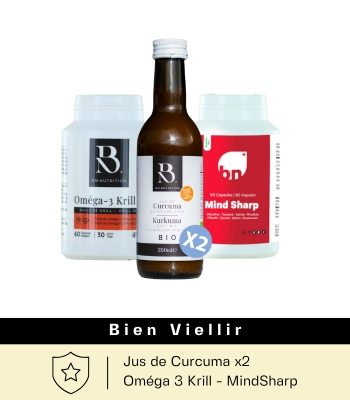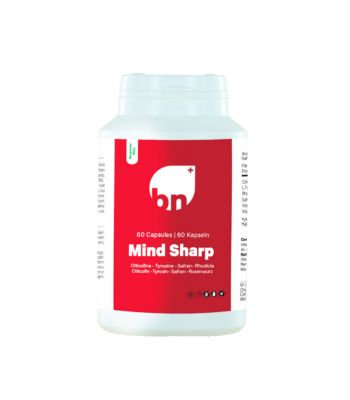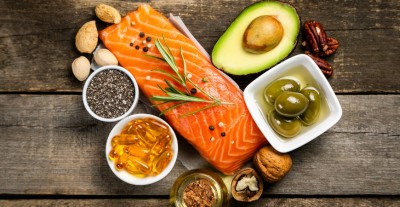Aging Well: The Webinar That Provides Concrete Keys to Live Better, Longer, and Healthier
Aging is a natural process, but it is not synonymous with decline. With a better understanding of the mechanisms of senescence and simple adjustments in our daily habits, it is now possible to live longer... and with more vitality!
This webinar led by Olivier Bourquin offers a holistic approach to ageing well: physical activity, nutrition, sleep, breathing, stress management, micro‑nutrition and mindset. Far from miracle cures, these are concrete, scientifically validated levers accessible to all.
Chapter 1 – Understanding Senescence
The word “senescence” may sound intimidating, but it simply refers to the biological process of cellular ageing. Every cell in our body has a limited lifespan: over time, some lose their ability to repair or divide correctly. Although this is natural, it is influenced by lifestyle.
Thus, it is not about “fighting” ageing, but accompanying it intelligently, optimizing our body’s key functions (muscles, brain, heart, immunity, etc.) to remain autonomous, active, and serene for as long as possible.
Chapter 2 – Life Expectancy: what does reality look like today?
While average life expectancy has risen dramatically over the past century, healthy life expectancy continues to lag, and in some countries even declines. The quality of those extra 10–15 years should be central.
✔ Life expectancy does not guarantee vitality
✔ Chronological age does not reflect physiological age
✔ Objective: age without dependency, with clarity, mobility, and purpose
Real examples from “Blue Zones” (Okinawa, Sardinia, Nicoya...) show that longevity and health go together when certain conditions are met: vibrant nutrition, regular movement, rich social life, stress control, and meaningful engagement.
Chapter 3 – Oxidative Stress: the silent accelerator
Aging is closely linked to oxidative stress, caused by an excess of free radicals. These unstable molecules damage our cells and accelerate signs of ageing – wrinkles, fatigue, loss of muscle or cognitive function. While oxygen is vital, unregulated excess becomes harmful.
✔ Too little oxygen = fatigue, hypoxia, reduced performance
✔ Too much oxygen = oxidative stress, chronic inflammation
✔ Goal: find the right balance, through breathing, movement, nutrition, and targeted supplements
At the cellular level, mitochondria degrade, ATP production drops, and antioxidant systems like SOD and catalase weaken. Neurotransmitters (dopamine, acetylcholine, serotonin) also decline.
➡️ Natural solutions like Turmeric, Krill Omega‑3, or synergy formulas such as MindSharp can help restore internal balance.
 |
✨ The essential combo to support your body and mind through the years The Ageing Well Pack combines three targeted products: MindSharp (focus, mental clarity), Omega 3 | Krill (anti‑inflammatory omega‑3s), and Organic Turmeric Juice (inflammation & antioxidants).
|
Chapter 4 – Physiological Systems & Age‑Related Changes
Over time, our physiological systems adapt, weaken, or become dysregulated. Understanding these mechanisms allows for targeted action:
- ✔ Basal metabolic rate decreases (on average –1 % per year from age 30)
- ✔ Musculoskeletal system suffers gradual muscle loss (sarcopenia), particularly after 40
- ✔ Nervous system sees reduced plasticity and neurotransmitter production
- ✔ Cardiovascular system becomes more rigid, with potential increase in blood pressure
- ✔ Hormonal functions drop: testosterone, oestrogens, DHEA, melatonin…
- ✔ Immune system declines, making infections more frequent
- ✔ Digestive system slows, as does renal function
- ✔ Sensory organs (vision, hearing, taste) lose acuity
By identifying these fragile zones, one can adjust lifestyle: muscle strengthening, micro‑nutrition, natural hormonal support, good hydration, joint mobility…
Chapter 5 – Micro‑nutrition & Longevity
Micro‑nutrition plays a central role in supporting these changes. Certain natural compounds are protective or regulatory for cellular ageing:
- ✔ Vitamin D: supports immunity, bone, and hormonal health
- ✔ DHEA: a key hormone in ageing; drops significantly after age 35‑40
- ✔ NAD (nicotinamide adenine dinucleotide): involved in cellular energy (ATP) production
- ✔ Testosterone, oestrogen, progesterone: influence libido, mood, tone, metabolic regulation
- ✔ Melatonin: sleep hormone, also antioxidant and neuro‑protective
➡️ These elements can be supported via diet, exposure to natural light, or well‑targeted supplements (with medical guidance if needed).
Chapter 6 – Physical Activity & Muscle Mass
Physical activity, properly dosed, is the strongest factor in slowing functional aging.
✔ Too little activity = muscle loss, increased fat mass, cardiovascular risk
✔ Too much activity = overtraining, chronic fatigue, immune fragility
➡️ The ideal is moderate but regular activity, combining gentle endurance (walking, cycling, swimming…) and strength work (resistance training, bodyweight, weights).
Sarcopenia (age‑related muscle wasting) begins from around 40. It is estimated that:
- ✔ 60 % of women over 60 years old
- ✔ 45 % of men over 60 years old
And yet, it can be largely slowed or even partially reversed through progressive training and a protein‑rich diet.
 |
Mental clarity, memory and focus… at any age! MindSharp is a synergy of botanicals and nutrients (Citicoline, L-Tyrosine, Rhodiola rosea, Safran, Vitamins B6 & B12) designed to support cognitive functions, even past 40 or 50 years.
|
Chapter 7 – Nutrition, Hydration & Inflammation
What we eat directly influences our longevity, energy, inflammation, and the ability to repair damaged cells.
Essential principles:
- ✔ Less processed foods, fewer simple sugars, fewer industrial fats
- ✔ More high‑quality proteins (fish, eggs, legumes, white meat…)
- ✔ More vegetables (for antioxidants & fibres), plus nutrient‑dense foods
- ✔ Less salt, alcohol, coffee, conventional dairy products
Hydration: drink more filtered or revitalised water, herbal teas, and avoid sweetened or overly stimulating beverages. Water is essential for cellular detox, digestion, and tissue oxygenation.
Chapter 8 – Mindset for Ageing Well
Mental outlook plays a central role in our health and vitality. A positive mindset, meaningful relationships, and purpose can make a real difference in longevity.
Psychological pillars discussed during the webinar:
- ✔ Take care of yourself mindfully, without pressure or obsession
- ✔ Stay connected, nurture relationships, avoid isolation
- ✔ Slow down, breathe, sleep, walk in nature
- ✔ Stay useful, share, and keep learning at any age
➡️ Tools such as meditation, breathing practices, gratitude, and social support have major impact on quality of ageing.
Chapter 9 – Top 10 Health Markers
To summarize, here are 10 key indicators to monitor as you age:
- Muscle mass
- Cardiac volume
- Blood sugar levels (glycemia)
- Oxygenation quality
- Basal metabolic rate
- Body temperature
- Bone density
- Blood pressure
- Fat mass (especially visceral fat)
- Nervous system functions
➡️ These are not just medical data, but real indicators of vitality and longevity. The good news: all these markers can be improved at any age.
Further reading: recommended books
Here are books and references mentioned by Olivier during the webinar:
- « Médecine de la longévité – Une révolution », Dr. Christophe de Jaeger
- « L’extraordinaire pouvoir des fascias en mouvement », Alexandre Munch (méthode MUNSCH-FLOHR)
- « Comment échapper à l’infarctus et à l’AVC », Dr. Michel de Lorgeril
- « Respirez », James Nestor
- « La bouche, miroir de votre santé », Dr. Bruno Donatini
- « Entraînez-vous comme une femme, pas comme un homme », Émilie Rimbert
To improve the quality of drinking water, Olivier recommends the Misora Pro filter (available from Misora), a simple and effective solution to revitalise your home drinking water.
Conclusion: ageing means staying alive
This webinar was an invitation to view senescence not as inevitable decline, but as a phase of transformation and opportunity.
Ageing well means adapting wisely: getting to know yourself, listening to your body, nourishing, moving, sleeping, loving, learning. It’s also about giving yourself the right tools — natural, physiological, accessible — to preserve what matters most: health, autonomy, joy.
Thank you all for your participation. The replay is still available above, and the products mentioned can be explored on our English‑language shop:
- MindSharp – Focus & Memory
- Ageing Well Pack (Krill, Turmeric, MindSharp)
- Krill & Vitamin D – Omega‑3
- Organic Turmeric Juice – BN Nutrition
FAQ – Healthy Ageing: your frequent questions
At what age should one start considering senescence?
From age 30, basal metabolic rate starts decreasing by about 1% per year. Prevention is therefore relevant early on, and good habits adopted young yield better long‑term results.
Is it really possible to slow muscle ageing?
Yes. With regular physical activity (especially strength training) and a diet rich in quality proteins, sarcopenia can be significantly slowed, or even partly reversed.
Which dietary supplements are most useful?
Some of the most beneficial include vitamin D, DHEA, NAD, melatonin, omega‑3s, antioxidants (turmeric, spirulina, polyphenols), and cognitive complexes like MindSharp to support memory and focus.
Is revitalised water really useful?
While not all studies are conclusive, filtered or revitalised water (e.g. with the Misora Pro) often improves taste, digestibility and may support cellular hydration.
How to breathe well to age better?
Deep, regulated nasal breathing, along with breathing exercises (coherence breathing, controlled breathing) can reduce oxidative stress and support cardiovascular and cerebral health.







